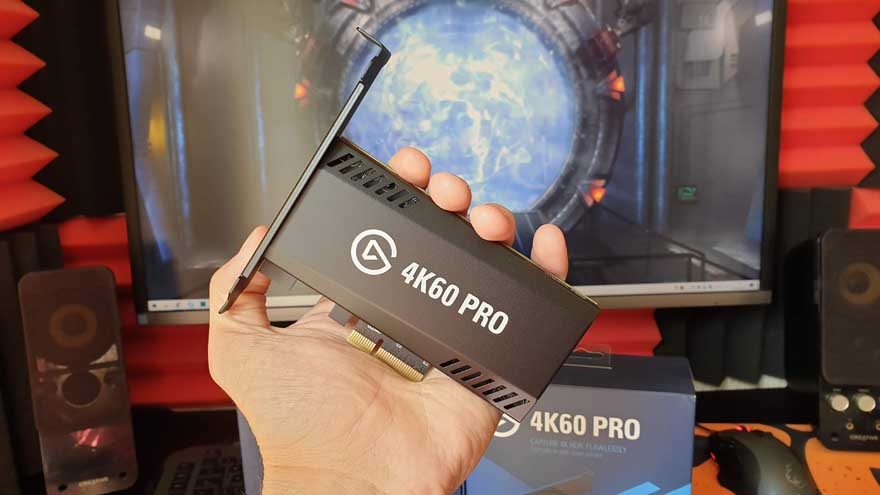Elgato 4K60 Pro HDR PCIe Capture Card Review
Peter Donnell / 5 years ago
A Closer Look
The card its self is pretty slick looking. It comes with a metal housing, which gives it a premium look and feel. However, I suspect it’s also part of the cooling mechanism as the whole thing is passively cooled. At least that’s one less thing that’s going to be making a whirring noise inside your system. There’s no mistaking it for what it is either, with that huge logo stamped right on the top.

Slim
The whole thing just takes up a single PCIe slot, and it’s not particularly big either. This bodes well for those with smaller PC cases. Plus, even if you have a dual GPU setup, it should still find a place to sneak into most ATX motherboards, so you’re not limiting your hardware options there. You can even run multiple capture cards in the system if you have a need for such things; eSports tournaments would be one example.

The back of the PCB is nothing fancy. There’s no backplate, but then again, it doesn’t really need one. Either way, it’s tidy enough as is.

Size
This is one thing I do love. It’s a simple backplate, sure, with just In and Out ports. I mean, anyone can understand that setup easy enough. Plus your gaming rig or console into the in port, your monitor in the out port; nice and easy.

However, if you’re using a slim PC case for the capture system, you can swap out the rear backplate. Similar design, it’s just half the width. Few will need this, but I thank Elgato for including it regardless.

Usage
Setting up the Elgato 4K60 PRO HDR Capture Card is pretty straight forward. It’s a PCIe device, so simply install it in an available slot on your system. Now, it’s often recommended you install it on a dedicated capture/streaming system. That means if you’re using a PC to game, you would have a second PC to stream. This can cut down on system overhead and latency.
Simply take the display output from your gaming PC, console, or similar device and jack into the input on the capture card. You can then use the out port to monitor the stream on a second display, depending on your setup.

Software
When it comes to recording or streaming, it’s a bit of an open book really. You can use the Elgato Game Capture software, as well as their 4K Capture Utility for Windows which you can download here. However, due to the plug and play nature, you can use Twitch, YouTube, OBS and any of the other big names pretty much instantly too. This also goes for editing software, with Adobe Premier and similar suites all proving happy to accept the card as a video input device. How you mix that all up, is really down to you. Do you stream, do you capture and edit, there are so many options. The good thing is, the Elgato devices give you the freedom to choose.
Plus, with support to use things like Elgato StreamDeck, Key Light and other technologies, you can expand on the ecosystem just as easily as you can set up the 4K60 Pro.
Quality
Now, it’s honestly as good as you might expect. I haven’t uploaded my own examples, as I don’t feel I would be adding much to what’s already out there on the web. However, if you meet specifications for the device, there’s no reason why your captures shouldn’t be bit-for-bit what you see on screen. Of course, we’re planning some big things with this, and Andy’s already putting together his streaming rig to use this card permanently for our Twitch streaming and more. You can check out our current streams here, so keep an eye out for when we deploy the 4K60 Pro! We already use the Stream Deck and Elgato Cam Link.



















